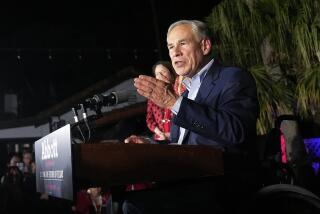Texas’ Past Independence Provides Group With Inspiration for Future
- Share via
SAN ANTONIO — It was a glorious day for John C. VanKirk, standing there on the steps of the state Capitol proclaiming Texas a nation unto itself.
As it was 150 years ago, it is today, he bellowed . . . the mighty Republic of Texas! Cheers and whoops rose from the crowd of more than 300, and VanKirk basked in them.
“Ladies and gentleman, Texas is legally--legally--no longer part of the United States of despair,” he shouted. “Texas is free. It’s once again sovereign, and its people will not be denied. God bless the Republic of Texas!”
It was Jan. 16 and VanKirk had just ordered Gov. George W. Bush to vacate his office. As president of the Republic, VanKirk would be moving in.
*
“How wacky do you think I am?” VanKirk asks seriously, leaning forward on his sofa.
Dressed in a short-sleeved shirt and tie, the 49-year-old former businessman is sitting in the living room of the new two-story house he leases near San Antonio.
It looks more like a bachelor pad than the headquarters of a sovereign nation. Nearly two dozen hunting trophies and gun posters cover the freshly painted walls. The living room is furnished with just a ragged couch and chairs. The garage has been turned into a makeshift office where three “citizens of the Republic” are sitting at long, collapsible tables, working on computers. A Lone Star flag drapes from the rafters.
Like most native Texans, VanKirk is enormously proud of the state’s maverick heritage and its Alamo heroes.
Texas is the only one of the contiguous 48 states to have been its own country, from 1836 to 1845. The allure of the Republic is so intense that eight attempts have been made over the years to return to nationhood.
The state’s tourism slogan even plays on its past: “Texas--it’s like a whole other country.” But for VanKirk and his supporters--Texas really is a whole other country. They believe Texas was never legally annexed by the Union and therefore has been under martial law for the past 150 years.
“If they weren’t so serious about it, it could be viewed as a comedy,” says Felix D. Almaraz, a history professor at the University of Texas, San Antonio. “Because of the seriousness, I think it’s rather tragic.”
Indeed, VanKirk’s agenda goes much deeper than Texas pride.
Like a growing number of Americans, he and his supporters have a deep distrust of the federal government. They resent income taxes, environmental regulations that encroach on their private property rights and government intrusion into their private lives. Disdainful of federal agents, they use Waco and Ruby Ridge, Idaho, as rallying cries.
Similar sentiments have given rise to armed militias, numbering more than 400 across the country. The Montana “freemen,” for example, who, like the Republic of Texas members, consider themselves a separate government with their own court system, have been holding federal agents at bay for two months.
Several “citizens” of the Republic have been convicted of using phony money orders, and one top member was jailed for contempt after a judge ruled he filed false liens against a title company. VanKirk himself acknowledges trying to use an $87,000 bogus money order several years ago to buy property.
No acts of violence have been attributed to the Republic of Texas, but authorities are wary of the group, which is forming an armed militia and wants to take over the government.
“It’s a revolution. I certainly want it to be a bloodless one if possible,” VanKirk says. However, he adds, “There’s no way one man can guarantee that.”
*
The smell of sausage wafts in from the kitchen, where VanKirk’s security advisor is making a pot of lunchtime gumbo. VanKirk is contemplating the rebirth of the Republic--the days before a confrontation split the group in two.
It was two years ago that Richard McLaren, a 42-year-old west Texas rancher with a history of land disputes with the federal government, recruited VanKirk to the cause. VanKirk had been in the real estate, ranching and oil equipment businesses and hadn’t paid federal income taxes for six years.
The two men understood each other--or so they thought. At an old cotton gin last December, they adopted a constitution and elected a council, including a secretary of defense assigned to form a militia. Following the lead of movements in 40 other states, they also formed a common law courts system.
Over the winter, the Republic gained strength. VanKirk’s impassioned speeches at the Alamo and the Capitol attracted hundreds of people--including tax protesters, militia members and others with anti-government sentiments.
But by March, McLaren and VanKirk weren’t getting along. McLaren accused VanKirk of being “dictatorial” and “going off the deep end.” At a meeting in Lubbock, the council voted to oust VanKirk.
Ever since, McLaren has taken over leadership of his faction of the Republic, calling himself “ambassador.” More than 10,000 people have signed up for $25 citizenship identification cards, members say.
In early May, McLaren arranged a common law court hearing in which the federal government, the International Monetary Fund and the Holy See of the Catholic Church were ordered to repay the Republic of Texas $93 trillion for 150 years of “plundering.”
A week later, a federal judge issued a $1.8-million judgment against McLaren for filing false liens against a title company, but McLaren refused to appear at a hearing and was jailed for contempt of court.
In the meantime, VanKirk is still acting as president. He never recognized his impeachment and said members tried to eject him because he wouldn’t pander to the “militia types” joining the Republic.
More to Read
Sign up for Essential California
The most important California stories and recommendations in your inbox every morning.
You may occasionally receive promotional content from the Los Angeles Times.













